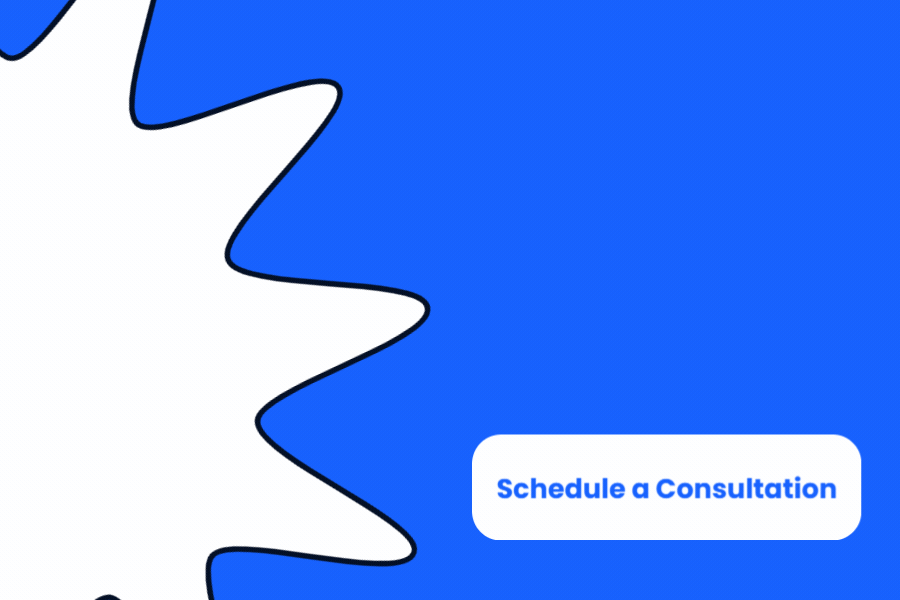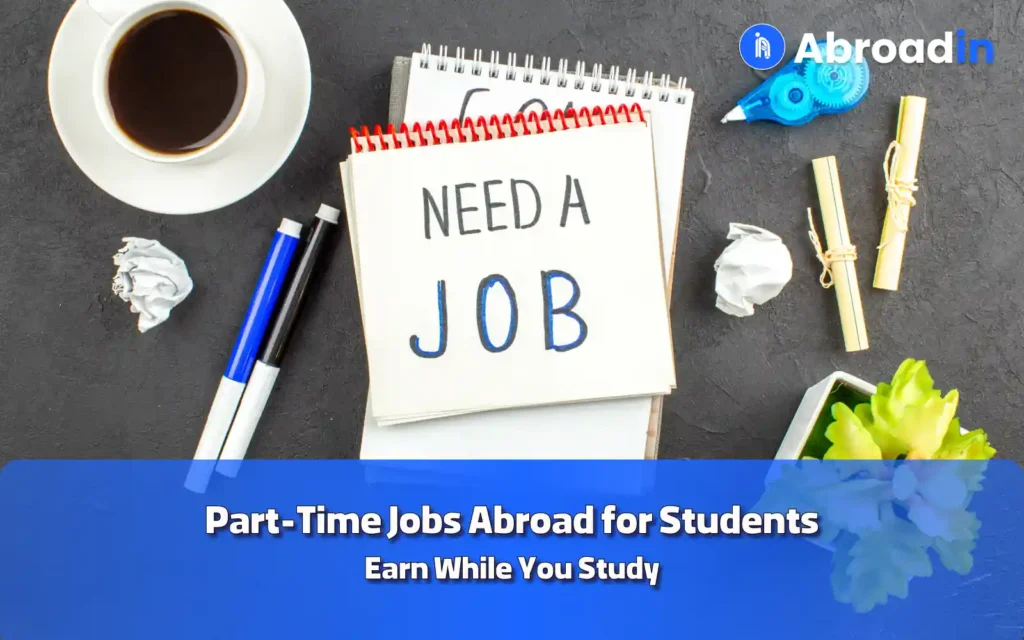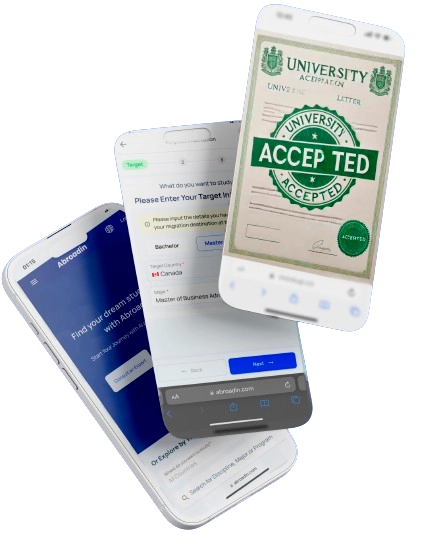

Dreaming of studying abroad but worried about the costs? This Abroadin guide explores how international students in Canada, the US, and Europe can leverage part-time work to offset expenses and gain valuable experience. We explore work permit requirements, work restrictions for international students, and visa restrictions across these popular destinations. Let’s turn your study abroad dreams into reality!
In this guide:
- Canada, International Students Work Permit
- The US, Work Restrictions for International Students
- Europe, How many Hours can International Students Work
- Conclusion
Canada, International Students Work Permit
Coming to Canada is a significant undertaking, and the costs can add up quickly. In addition to tuition, rent, and groceries, you’ll likely want to explore the country and enjoy social activities with friends.
Working part-time while you study is a fantastic way to offset these costs and gain valuable experience in the Canadian job market. Here’s what you need to know before applying for part-time work in Canada:
Securing a Social Insurance Number
Everyone working in Canada, regardless of citizenship status (citizen, permanent resident, or international student), requires a Social Insurance Number (SIN).
The application process through the federal government is relatively straightforward, and it’s recommended to apply before arriving in Canada.
International Students Work Permit Restrictions
Some conditions are associated with working as an international student in Canada. For instance, you can only begin working once your academic semester starts. While you can search for a job upon arrival, you can officially start then.

Temporary Relaxation of Hour Limits
The good news is that the government has temporarily lifted one of the work restrictions for international students. Previously, they were limited to working a maximum of 20 hours per week during the school term. This limit has been waived until the second notice.
It provides more flexibility for students who may have previously struggled to find employers willing to accommodate the 20-hour cap. Remember, while you can now take on more shifts, prioritize your studies and maintain a healthy balance.
Here are the specific requirements for students to qualify for the waived 20-hour limit:
- Hold a valid study permit.
- Be enrolled full-time (or part-time during your final academic session).
- Have a study permit application (or extension) submitted to IRCC on or before October 7, 2024.
- Have a study permit with a condition allowing off-campus work.
New Work Permit Rules for International Students
On January 22, 2024, Immigration, Refugees, and Citizenship Minister Marc Miller announced a two-year temporary cap on the number of new study permits issued to international students annually.
This cap is expected to significantly reduce the number of study permits issued in 2024. The federal government aims to approve approximately 360,000 undergraduate permits—a 35% decrease.
The cap will be distributed proportionally based on provincial populations, potentially leading to a steeper decline (up to 50%) for provinces like Ontario and British Columbia.
While the cap excludes graduate and professional students as well as those applying for elementary or secondary school permits, additional changes impact international students’ work permit availability.
Effective September 1, 2024, postgraduate work permits will no longer be available to graduates of public-private institutions. Additionally, open international students’ work permit eligibility for their spouses will be restricted to spouses of graduate and professional students only.
These new limitations could pose challenges for the Canadian labor market, which already grapples with significant skill gaps and relies heavily on foreign workers in many sectors.
if you want to know more information about working limits in Europe for International Students:
The US, Work Restrictions for International Students
To study full-time in the United States, you’ll typically need an F or M visa, both designated for international students.
Eligibility for either F-1 or M-1 visas hinges on these key requirements:
- Enrollment in an approved academic, language training, or vocational program.
- Your school must be authorized by the Student and Exchange Visitors Program (SEVP)
- Full-time student status at the institution.
- English proficiency or enrollment in English language courses.
- Sufficient financial resources to cover your entire study period.
- Maintaining a foreign residence, you intend to return to.
F-1 Student Visa
Specifically, the F-1 Visa allows full-time study at accredited institutions like colleges, universities, high schools, and language training programs. The program must offer a degree, diploma, or certificate, and the US government must authorize your school to enroll international students.
M-1 Student Visa
The M-1 visa caters to international students seeking vocational or practical skills outside of traditional academic programs and language training.
These programs focus on hands-on learning and equip students with industry-specific knowledge and certifications in fields such as cosmetology, automotive repair, or computer networking.
However, unlike F-1 student visa holders, M-1 visa holders generally cannot work off-campus until they have completed their studies.
Employment for International Students
There are work restrictions for international students with F-1 visas. During the first year, they can only work on campus under specific conditions. After the first year, F-1 students have options for off-campus work authorization:
- Curricular Practical Training (CPT): This allows for work directly related to their field of study.
- Optional Practical Training (OPT): This can be pre-completion (during studies) or post-completion (after graduation).
- Science, Technology, Engineering, and Mathematics OPT: This extends the OPT period for students in STEM fields.
In special circumstances, such as severe economic hardship, F-1 students may be eligible for additional off-campus work authorization on a case-by-case basis. M-1 students can only participate in practical training after completing their studies.
For both F-1 and M-1 students, any off-campus work must be related to their area of study and needs prior approval from the Designated School Official (DHS) and USCIS.

New Guidance Simplifies Rules for F and M Visa Holders
The US Citizenship and Immigration Services (USCIS) recently updated its policy guidance for F and M student visas. It clarifies regulations and streamlines the process for international students seeking work opportunities in the US. Here’s a breakdown of the key changes and how they impact you:
Maintaining Foreign Residence
The policy emphasizes maintaining a foreign residence while studying in the US. However, it acknowledges that students can explore permanent residency options like green cards. The emphasis remains on demonstrating your intention to return home after completing your studies.
STEM Students Get a Boost
The update allows F-1 students in STEM fields to extend their Optional Practical Training (OPT) and work with startup companies. It opens doors to valuable experience and broader career opportunities.
But remember, both students and employers need to comply with work restrictions for international students and specific requirements like outlined training plans and fair compensation.
Clearer Guidelines for All
USCIS has provided more detailed explanations regarding maintaining student status, including transferring schools, exploring work options, and applying for various benefits. This clarity empowers students to make informed decisions but also emphasizes the need to ensure their activities align with visa regulations.
Planning for the Future
Whether considering long-term residency or post-graduation employment, factor in these updated guidelines. It’s up to you to stay informed about immigration policies that might affect your status.
USCIS’s revised policy aims to simplify the student visa system, benefiting both students and employers. For students, it opens doors to new career opportunities and clarifies pathways to permanent residency.
Employers gain access to a wider talent pool, particularly in STEM fields. With a focus on compliance and expert guidance, this revised guidance fosters an environment of growth and mutual benefit for international students and American companies.
if you want to know more about What are the Best Countries to Work and Study Abroad? read this article:
Europe, How many Hours can International Students Work
Many European countries allow international students on visas to work part-time, but limitations on the number of hours may vary. This opportunity to work attracts students seeking financial support or valuable work experience.
However, navigating employment regulations as a student requires understanding the specific rules of each country. Employment rights for international students depend on several factors:
- Student’s Home Country: Regulations might differ based on your nationality.
- Host Country’s Laws: Each European nation has its own set of employment laws.
- Type of Visa Held: The type of visa you possess will determine your work eligibility.
Students from the European Union (EU) generally enjoy the same employment rights as citizens of their host country. However, non-EU students may face some restrictions.
In most European countries, international students with appropriate visas can typically work part-time while studying. The permitted number of hours can vary, and some countries might have additional limitations on the types of jobs students can take or the total duration of allowed work.
It’s crucial to research the specific regulations in your chosen European destination before starting your studies. Let’s explore some specific examples:
- France: International students can work part-time, with a maximum of 20 hours per week, even during their first year.
- Spain: Non-EU students on a student visa can work up to 20 hours per week.
- UK: International students on a Tier 4 visa can work up to 20 hours per week during term time and full-time during academic breaks.
- Denmark: Students can work up to 20 hours per week during the school year and full-time during breaks.
- Estonia: There are no work restrictions for international students on work hours for those who maintain passing grades.
Understanding and adhering to these regulations allows international students to make informed decisions about work opportunities while studying in Europe.
Conclusion
Working as an international student offers financial support and valuable experience. Whether in Canada, the US, or Europe, navigate international students’ work permit regulations carefully. Research your chosen country’s limitations and seek guidance from official sources or university career services.
With informed decisions, international student work can enrich your studies and career path. Read the other blog posts in Abroadin for more specific information about work restrictions for international students in each country.
Resources:
https://www.idp.com/canada/blog/working-in-canada-as-an-international-student/
https://studyinthestates.dhs.gov/students/work/working-in-the-united-states
https://www.boundless.com/blog/new-uscis-guidance-for-international-students-companies/
https://europa.eu/youreurope/citizens/education/university/working-while-studying/index_en.htm


How useful was this post?
Click on a star to rate it!
Average rating 0 / 5. Vote count: 0
No votes so far! Be the first to rate this post.








No comment yet, add your voice below!